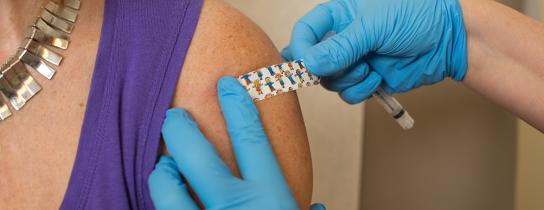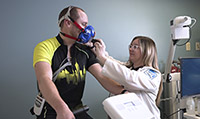
Protect Yourself and Others This Flu Season – A Message from the Infectious Disease Specialists at Crystal Run Healthcare
Flu season is upon us and this season is more severe than the last. Influenza, commonly referred to as the flu, is a contagious respiratory illness that, in severe cases, can result in death. Different flu viruses, known as strains, make it difficult to combat the sickness, however it’s important to note there are ways to prevent the flu.
But first, let’s take a look at the recent statistics surrounding this year’s flu season:
- The CDC estimates as of December 28th there have been:
- at least 6.4 million flu illnesses;
- 50,000 hospitalizations;
- 2,900 deaths from the flu, including 27 pediatric patients.
- The New York State Department of Health reported from December 29th – January 4th alone:
- 10,085 laboratory-confirmed influenza reports
- 168 cases in Orange County
- 51 cases in Sullivan county
- 10,085 laboratory-confirmed influenza reports
These statistics vastly underestimate the actual number of cases of the flu, because many if not most flu is diagnosed on clinical grounds, rather than on the basis of laboratory testing.
If you get the flu, it can cause significant complications, including bronchitis and pneumonia. Certain populations, like young children, the elderly, pregnant women, people with cancer or compromised immune systems, lung disease including asthma, HIV, and diabetes, are all considered to be high-risk for contracting the flu.
What Are the Symptoms?
Signs of the flu can vary from person to person, but symptoms to watch out for include:
- Fever or feeling feverish/chills
- Cough
- Sore throat
- Runny or stuffy nose
- Muscle or body aches
- Headaches
- Fatigue (tiredness)
- Vomiting and diarrhea, though this is more common in children than adults.
If you have any flu-like symptoms, you should immediately make an appointment with your primary care physician or visit an Urgent Care Center near you. It’s important to catch the flu early in order to start treatment. Antiviral medications, if started promptly, can lessen your symptoms or shorten their duration by 1 to 2 days. Taking medication also can prevent the development of serious complications like pneumonia.
How to Prevent the Flu
There are precautionary steps you can take to help prevent getting and spreading the flu:
- Try to avoid close contact with sick people.
- If you are sick, stay home for at least 24 hours after your fever is gone, except to get medical care.
- Cover your nose or mouth with a tissue when you cough or sneeze.
- Wash your hands often! Washing with soap and water is best, but you can also use alcohol-based hand sanitizers in a pinch.
- Avoid touching your eyes, nose, and mouth. Germs spread this way.
- Clean and disinfect surfaces and objects that may be contaminated with germs like flu.
Finally, the most important thing you can do to prevent the flu is to get vaccinated. There are many options available, so check with your doctor as to which one is right for you. The most important thing is that every person over 6 months of age should get vaccinated every year.
The flu vaccine works to prevent flu and reduce the risk of flu-associated hospitalization for children, working age adults, and older adults. It reduces the risk of complications in pregnant women and those with chronic conditions, such as diabetes and lung diseases. Getting vaccinated can also help prevent the spread of flu to those who are vulnerable to disease, like babies, young children, and adults who are immunocompromised and can’t receive the vaccine themselves.
If I Get the Vaccine, Will I Get the Flu?
The answer is no, it’s a common misconception that you can get the flu from the flu vaccine. The flu shot is not a live virus vaccine, so there is a low risk of side effects. Common mild and short-lived side effects people can experience are soreness in the arm, headache, mild body aches, and even becoming feverish. These symptoms are very minor compared to the flu itself.
For those of you who avoided the flu vaccine because of an egg allergy, the good news is that this year’s vaccines are safe in anyone who does not have a severe allergy – for those who don’t experience their throat closing or shortness of breath when they have eggs. If you are able to eat eggs, then you can get the flu vaccine.
Even though it’s already January 2020, this flu season is just getting started. It is not too late to get the flu vaccine. Get your flu shot today at your doctor’s office or even a local pharmacy. To help combat the flu epidemic, Crystal Run Healthcare is offering flu clinics at multiple locations. Please visit our website www.crystalrunhealthcare.com/flu for dates and to schedule an appointment for your flu shot.
About Crystal Run Healthcare
Crystal Run Healthcare is a physician-led, multispecialty medical practice with over 400 providers and locations throughout Orange, Sullivan and Rockland counties, including five Urgent Care centers in Middletown, Monroe, Newburgh, Rock Hill, and West Nyack. The Practice offers both primary care and access to more than 50 specialties, including Infectious Disease, all under one roof in many locations. To schedule an appointment with a Crystal Run provider, call 845-703-6999 or book online at CrystalRunHealthcare.com/Appointments.
About the Authors
Anousheh Ghezel-Ayagh, MD, Infectious Disease Specialist earned his Medical Degree from Tehran University of Medical Sciences and completed his Residency in Internal Medicine at St. Vincent’s Hospital and Medical Center in Worcester, MA. He is Board Certified in Infectious Disease and completed his Infectious Disease Fellowship at University of Connecticut in Farmington, CT. He specializes in all aspects of Infectious Disease and is seeing patients at Middletown, Monroe, Newburgh, Rock Hill, and Warwick locations.
Malloy Nair, MD, Infectious Disease Specialist earned her Medical Degree from SUNY Health Science Center at Brooklyn, NY and completed her Residency in Internal Medicine at Robert Wood Johnson Medical Center in New Brunswick, NJ. She is Board Certified in Internal Medicine and Infectious Disease and completed her Infectious Disease Fellowship also at Robert Wood Johnson Medical Center. She specializes in general Infectious Disease and is seeing patients at Middletown, Monroe, Newburgh, Rock Hill, and Warwick locations.
 Cardiopulmonary Exercise Testing (CPET)
Cardiopulmonary Exercise Testing (CPET) Request medical records online
Request medical records online